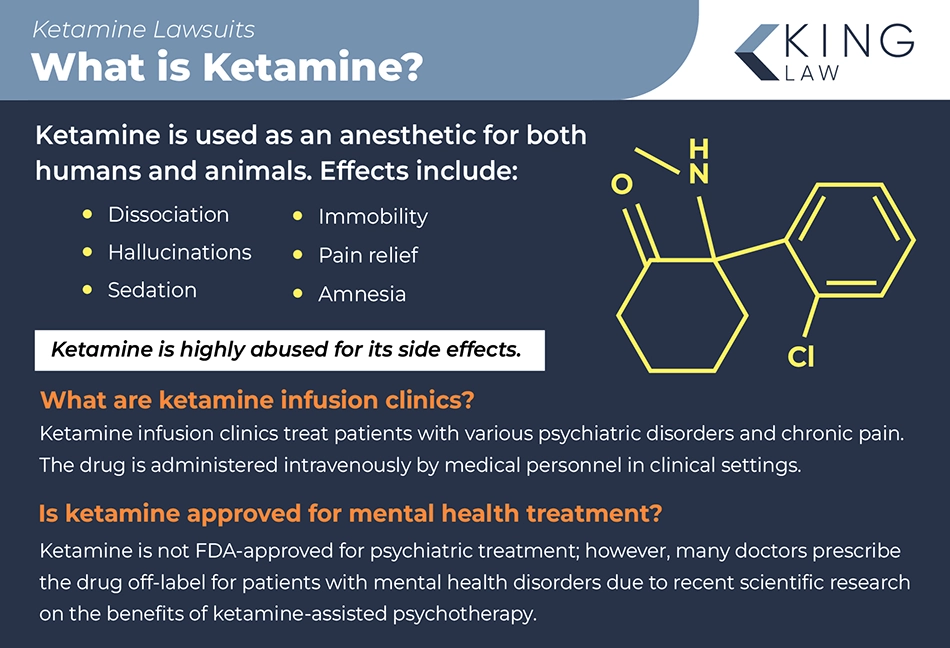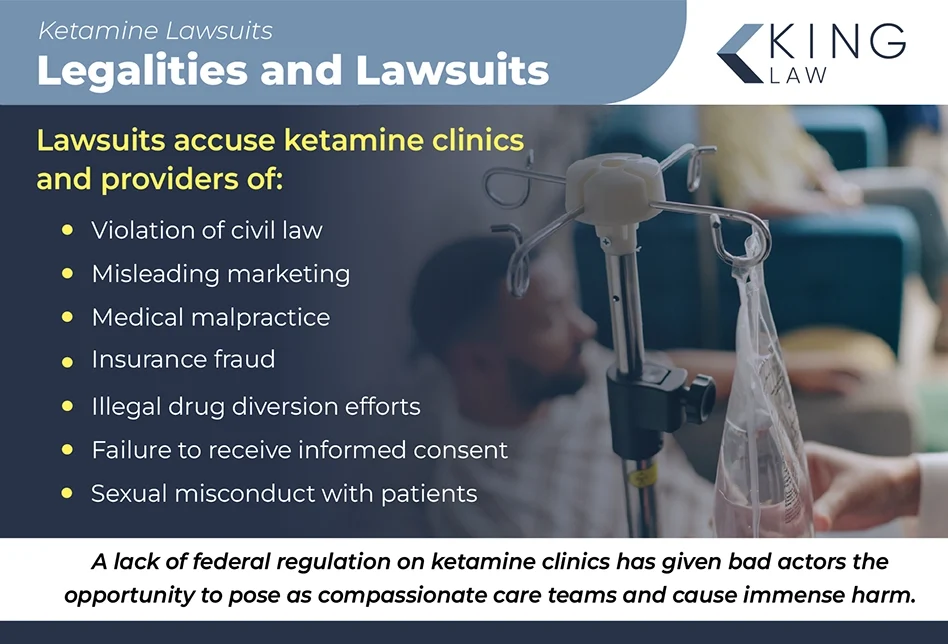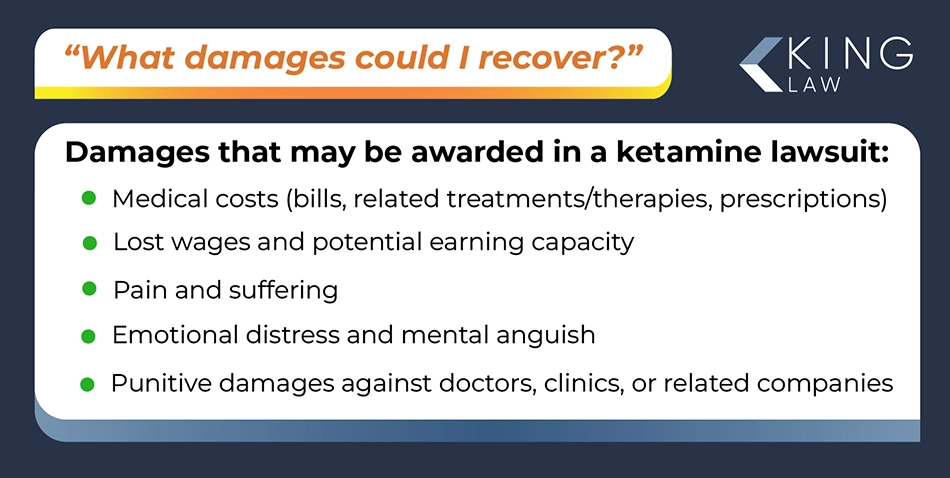Complete the form below to see if you qualify for a Ketamine Lawsuit

Ketamine clinics across the United States are facing a growing number of lawsuits because of misconduct related to medically supervised ketamine therapy. People accuse clinics, owners, and providers of fraud, sexual misconduct, medical malpractice, and illegal drug diversion. The accusations are being lodged by patients, investors, and family members.
On this page, you will find information about ketamine lawsuits, including a regularly updated timeline of these cases. This page also discusses the claims being made against ketamine providers and clinics. Here, you can also learn about how to file a ketamine lawsuit, who qualifies, what your payout could be, and the role of a ketamine lawyer, if you choose to hire one. King Law is actively reviewing ketamine claims, and we can help you understand the changing laws around ketamine treatments, provider misconduct, and lawsuit eligibility.
About the Ketamine Clinic Lawsuit
Ketamine Lawsuit – 2025 News and Updates
What Is the Ketamine Lawsuit About?
Why Do People Seek Treatment at Ketamine Clinics
Legal Basis of the Ketamine Clinic Lawsuits
What Are the Allegations Against Ketamine Clinics?
Who Qualifies to File a Ketamine Lawsuit?
What Damages Can I Recover in a Ketamine Lawsuit?
How to File a Ketamine Lawsuit
What Is the Deadline to File a Ketamine Lawsuit?
Estimated Ketamine Lawsuit Payout Amounts
Benefits of Hiring King Law For a Ketamine Lawsuit
Ketamine Lawsuit – 2026 News and Updates
December 29, 2025: Ketamine Therapy Provides Mixed Results for Patients
Ketamine therapy is becoming increasingly popular, marking a shift away from traditional medication towards alternative therapies to address depression, PTSD, and other mental health challenges. Ketamine patients have experienced mixed results, with some finding life-changing relief through ketamine treatments while others are abused and mistreated by ketamine providers. The cost of ketamine treatments can vary widely from one clinic to another, and, since there are few regulations in place, so can the quality of care that a patient receives. People who have experienced abuse, harassment, or other losses because of ketamine treatments or the clinics that supplied them are encouraged to talk to a lawyer about their legal rights.
December 3, 2025: Awakn Seeks Approval to Prescribe Ketamine to People with Behavioral Addictions
Awakn, a biotechnology company, plans to apply for patent protection in multiple countries to use its ketamine therapy to treat some behavioral addictions. Awakn has completed a clinical study about using ketamine to treat behavioral disorders, including gambling addiction, compulsive sexual behavior disorder, and video game addiction. The results of the ketamine trial were mixed, with some participants seeing improvement in symptoms. Ketamine clinics and therapy are not consistently regulated in the United States, and many ketamine doctors, pharmacies, and clinics have been misleading, abusing, and mistreating patients. Lawsuits are being filed by patients and their surviving loved ones for injuries caused by Ketamine providers.
November 17, 2025: Pharmaceutical Company Says Prescription Ketamine Market Will Rapidly Grow
More people are seeking ketamine infusions as a way to battle depression, suicidal ideation, chronic pain, PTSD, and other conditions. The demand for ketamine treatment has coincided with the opening of clinics across the U.S. In order to supply ketamine to these clinics, NRx Pharmaceuticals has refiled its generic ketamine application with the FDA. The company hopes its additive-free ketamine infusions will catch on with patients. The company expects that the ketamine market will expand over the next 10 years, driving an expected revenue of $3.35 billion by 2034. For some people, ketamine treatments are life-changing and a positive experience. Other people, who unknowingly seek help from harmful practitioners, have been injured or lost their lives. Patients and surviving family members are filing lawsuits against the ketamine clinics and providers who have harmed people.
November 5, 2025: Father of Son Who Overdosed Sues Online Ketamine Prescriber, Mindbloom
Phillip Ward’s father is suing Mindbloom, an online ketamine provider, after Phillip died from a ketamine overdose. Phillip had a history of substance use disorder, high blood pressure, and an abnormally high heart rate. He also missed several appointments with Mindbloom prescribers and was unable to pay his subscription on time. Still, Mindbloom ignored these red flags and allowed Phillip to receive ketamine at home and administer it without supervision. Phillip died of a ketamine overdose within months after starting the ketamine treatments.
October 16, 2025: Ketamine Clinic Owner Loses Licensure After Harming Patients
A psychologist in Ontario, Canada, has lost her government certificate of registration after an investigating panel found her psychology clinic breached professional standards. Tatiana Zdyb was found to have illegally prescribed ketamine to patients and engaged in various other forms of misconduct, including sexual assault of patients. Zdyb and other providers in the United States have been accused of improperly administering ketamine to treat various psychiatric disorders. Many patients have experienced severe injuries and mental health harms while under the care of such clinics. Lawsuits have been filed against ketamine clinics and providers.
October 3, 2025: Mother Sues After Daughter Is Prescribed Ketamine and Kills Herself and Her Children
A woman in Wyoming is suing a ketamine clinic (Sage Psychiatry Services) that prescribed her adult daughter, Tranyelle, high doses of ketamine, which Tranyelle would take at her home. Tranyelle suffered from post-traumatic stress disorder and postpartum depression, and her mother believes the prescribed ketamine drove her daughter to kill herself and her children. Ketamine clinics and usage, while technically legal, are poorly regulated, and many people are given it without proper supervision. This lawsuit is one of dozens being filed by ketamine patients and their surviving loved ones who experienced harassment, abuse, or medical negligence from ketamine clinics and doctors who promised to help them.
September 17, 2025: Ketamine Dealer and Doctors Plead Guilty in Matthew Perry’s Death
Several doctors and the so-called Ketamine Queen have pled guilty to criminal charges related to Matthew Perry’s death, which is believed to have been due to complications from ketamine. It is unclear why Perry had been prescribed or given ketamine. However, ketamine is becoming a popular drug to help relieve symptoms of treatment-resistant depression and suicidal ideation. Some patients have experienced immense benefits from using this medication under the supervision of a reputable doctor. However, other people are experiencing abuse and misconduct by those who prescribe, administer, or supply the medication. They are filing lawsuits against the clinics and providers who harmed them.
September 3, 2025: Study Examines Ketamine, Depression, and Suicidal Ideation
Researchers have been studying how ketamine can be used as a treatment for reducing some types of depression and suicidal ideation. A recent study found that ketamine injections can help some people suffering from treatment-resistant depression and suicidal ideation. Findings like this have spurred ketamine clinics to open around the country. However, some of these clinics have hurt patients more than they have helped them. Some clinicians have used ketamine off-label to treat other forms of depression or mental disorders, often giving higher doses than needed. Some patients at these clinics have passed away or suffered severe side effects after ketamine treatment. This has led to lawsuits being filed against the clinics and doctors who hurt patients.
July 30, 2025: Canadian Psychologist’s Ketamine Clinic Shuttered After She Settles Lawsuit Filed by Patient
A psychologist in Ontario, Canada, faces disciplinary actions due to how she handled ketamine-assisted therapy with clients. Tatiana Zdyb certificate of registration is under an interim suspension because of allegations of professional misconduct. According to the BBC, Zdyb is accused of three separate cases of misconduct, including a case where she prescribed a patient ketamine treatments and sexually abused the patient.
January 30, 2024: Ketamine Industry Described as “Wild West” As More Clinics Pop Up with Little Oversight
The off-label use of the powerful psychedelic ketamine for depression, PTSD, suicidal behaviors, and other conditions has skyrocketed. As a result, there are now hundreds of ketamine clinics across the United States, many of which do not have proper training or protocols to keep patients safe. Each clinic has broad discretion over how it prescribes and administers ketamine to its patients, as long as they are following the DEA’s restrictions on how to handle and give out this controlled substance. Clinics and doctors are facing dozens of lawsuits claiming they caused patients to suffer from preventable harm, such as death and psychological injury.
January 11, 2024: St. Louis COPE Ketamine Clinic Doctors Admit Wrongdoing in Ketamine Fraud Cases
Dr. Ali and Dr. Malik have admitted to breaking the law when operating their St. Louis-based facility, COPE Ketamine Clinic. While running their healthcare practice, they were dishonest about whether the ketamine treatments were supervised and administered by a DEA-licensed provider. Dr. Ali is also accused of giving ketamine prescriptions to patients who were selling or giving away the drug to others. The doctors are also charged with a host of insurance and billing fraud claims, which they do not dispute.
November 18, 2024: Doctor Faces Civil and Criminal Charges for Assaulting His Ketamine Patients
Multiple civil and criminal lawsuits claim that Dr. Mark Rollin Young would drug and abuse his ketamine patients while administering treatments in his office. As many as 13 victims have come forward or are mentioned in the lawsuits. These patients came to the clinic for relief from chronic pain, depression, PTSD, and suicidal behaviors. Dr. Young, who ran Apex Ketamine Therapy in Colorado, cannot be located to be served with the legal paperwork, so the lawsuits have been stalled. Dr. Young also got into trouble with the Colorado Medical Board for treating patients while under the influence, prompting him to promise that he would stop treating patients for an indefinite period of time.
November 7, 2023: Study Finds Clinics Are Being Dishonest in Advertisements for Direct-to-Consumer Ketamine Products
Dozens of ketamine clinics are untruthful in their ketamine advertisements to consumers, a review finds. The FDA has approved ketamine for use as a pain-relieving medication in specific situations; however, injectable ketamine is not approved to treat psychiatric conditions. Companies that sell ketamine directly to consumers have misled them about what the products are approved for and the benefits ketamine infusions can provide. Many of these ketamine companies have also downplayed or failed to mention the risks of abuse, addiction, and even death.
October 29, 2018: Minnesota Hospital Gives Ketamine to ER Patients Without Consent as Part of Unlawful Clinical Trial
The Hennepin County Medical Center gave emergency room patients ketamine without telling them or asking permission, a review by Public Citizen finds. The medical center said it wanted to test how ketamine and other powerful antipsychotic drugs worked to soothe agitated patients. According to the FDA’s inspection of the hospital, the hospital lied on the paperwork it used to ask the FDA for permission to perform trials. Then, the hospital was unlawful again when it carried out the improper clinical trials. The hospital tried to claim that it was not required to ask the patients for consent; however, the FDA and Public Citizen have said the patients had a right to be told and asked about the ketamine injections.
What Is the Ketamine Lawsuit About?
Ketamine lawsuits are about clinics and providers who were negligent and harmful in administering ketamine to patients battling mental health disorders and chronic pain.
Ketamine infusion clinics are being sued because some of these clinics have been careless, medically negligent, and criminal in how they prescribed and administered ketamine to patients. The FDA has approved ketamine as an anesthetic; however, many physicians are prescribing injectable ketamine for pain disorders and mental health conditions, like depression, anxiety, post-traumatic stress disorder (PTSD), and complex regional pain syndrome (CRPS). Because this is an off-label use, the FDA does not entirely regulate how and when physicians administer ketamine treatments to patients.
The result has been a dangerous and inconsistent medical service that has opened the door to false advertising, abusive practices, criminal activity, and informed consent concerns. Some providers have used ketamine to manipulate and abuse patients under their care.
Why Do People Seek Treatment at Ketamine Clinics
Ketamine clinics and providers have capitalized on the rising transparency surrounding mental health care and treatment. People who have anxiety, PTSD, anxiety, depression, other mental health disorders, and chronic pain may seek out treatment at a ketamine clinic. Due to scientific research about the benefits of ketamine-assisted psychotherapy and pain management, many people have turned to infusion clinics for relief.
Ketamine is a psychoactive drug that provides sedation, pain relief, and dissociative effects. For some people, ketamine infusions offer reliable treatment and meaningful progress toward a healthier life. For other patients, especially those who receive care at negligent clinics, their treatments lead to new or worsening conditions and negative life impacts.
The FDA has not approved ketamine for treating psychological conditions or chronic pain, but many clinics prescribe and administer ketamine off-label for these purposes. The FDA is examining how ketamine should be used as a therapy, but regulations remain minimal. In fact, the FDA has warned patients who receive compounded ketamine infusions of serious health risks, as the market may be underregulated.

Legal Basis of the Ketamine Clinic Lawsuits
The legal basis of ketamine lawsuits is that providers and clinics failed to protect their patients and misrepresented the safety and effectiveness of their services. The lawsuits against ketamine clinics accuse these businesses of breaking several laws.
For example, lawsuits accuse clinic owners and medical providers of:
- Committing fraud in how they charged for the ketamine treatments
- Unethical handling and distribution of ketamine by medical providers
- Violating consumer protection laws about how companies market, sell, and provide products to the public and patients
- Lack of safety and research-based protocols at the clinics
Because ketamine treatments and poisonings have skyrocketed in recent years, lawmakers are scrambling to make sure they have appropriate protections in place to curb abuse and injury rates. However, these protections have not come soon enough for many patients who have been permanently injured or lost their lives to medically unsound treatments. As such, patients and surviving loved ones may have a legal claim against the provider or health clinic that prescribed them ketamine.
What Are the Allegations Against Ketamine Clinics?
There are several different allegations against the owners and practitioners associated with ketamine clinics. People are accusing doctors and ketamine clinics of several different forms of misconduct.
Some allegations against ketamine clinics include:
- Violations of civil law violation
- Misleading marketing
- Medical malpractice
- Insurance fraud, including Medicaid and Medicare
- Sexual misconduct with patients
- Illegal drug diversion efforts
- Failure to get informed consent from patients
Despite these violations, ketamine clinics have multiplied across the United States. According to a report from Grand View Research, the U.S. ketamine clinics market size in 2023 was estimated at $3.41 billion. The researchers expect this market to grow around 10.6% year-over-year between 2024 and 2030. This means many analysts expect more ketamine clinics to be opened across the U.S, possibly jeopardizing the health and well-being of thousands more patients.
To date, a number of these clinics and practitioners have engaged in unsafe and even sinister activities. Because governing bodies have not set clear standards for how ketamine clinics are run, bad actors disguised as compassionate care teams have been allowed to cause immense harm. As more victims file lawsuits and spread awareness about what is really happening, much-deserved justice and policy changes will be set in motion.

Who Qualifies to File a Ketamine Lawsuit?
Potentially, anyone who bought ketamine from a doctor, clinic, or healthcare company in person or online may qualify for a lawsuit. They would need to prove that whoever gave or administered the ketamine to them harmed them. This might include situations where the doctor used ketamine to sedate and take advantage of a patient, or where an online drug company promised that ketamine would treat depression successfully, and it did not. The ketamine lawsuits are in their early stages, and victims are coming forward about many different injuries. If you think you may have been treated poorly by a ketamine provider, talk to a lawyer to learn about what your rights are.
What Damages Can I Recover in a Ketamine Lawsuit?
If you win your ketamine lawsuit, you may qualify for a range of compensation to cover your losses. The financial award you receive depends on factors such as the types of injuries you experienced. Typically, victims who win their claims would receive economic and non-economic damages.
Economic Damages
Ketamine victims may qualify to receive a financial award to reimburse them for their out-of-pocket expenses flowing from the injury. For example, this could include the following:
- Lost earnings or lost earning capacity
- Hospital bills
- Prescription medications
- Therapy
- Rehabilitative services
- Repair costs for an accident caused by ketamine negligence
If the victim of ketamine negligence dies, their surviving loved ones may bring a claim on their behalf, through a wrongful death lawsuit. Some of the compensation their family members might receive includes funeral expenses and loss of support.
Non-Economic Damages
Ketamine negligence can be emotionally, mentally, and relationally costly, leaving lasting trauma and challenges behind. Victims may be eligible for non-economic losses, including:
- Pain and suffering
- Loss of enjoyment in or quality of life
- Emotional distress
- Post-traumatic stress disorder
- Mental anguish
The court may also impose punitive damages on at-fault doctors, clinics, or companies whose misconduct was especially harmful, such as if the doctor assaulted the patient.

How to File a Ketamine Lawsuit
The first part of filing a ketamine lawsuit is determining if you qualify to bring a case. The most effective place to start is by scheduling a free consultation with a reputable law firm who can provide a personalized case review. They can tell you if you are eligible for compensation and help build and bring a strong case on your behalf.
The next part of the process is to collect evidence you can use to support your claims against the ketamine provider. Materials you may want to locate include your medical and insurance records, the names of witnesses (doctors, nurses, loved ones, etc.), and requests for time off work because of the ketamine injuries. Then, you or your attorney would put this together in a legal complaint and file it with the appropriate courthouse. Your lawyer would try to settle the lawsuit, and if the settlement attempts are unsuccessful, they would press the case on to a full trial.
What Is the Deadline to File a Ketamine Lawsuit?
You must bring your ketamine lawsuit before the deadline expires. The exact timeframe you have to file a claim against the person who harmed you depends on a number of factors, including what kind of allegations you are making (medical malpractice, personal injury, etc.) and what state you file your lawsuit in. States have statute of limitations (filing deadlines), and many of these also have exceptions that can change the timeframe in which you would need to submit a case. Contact an attorney as soon as possible to learn about the deadlines and take steps to meet them before the clock runs out.
Estimated Ketamine Lawsuit Payout Amounts
The amount that someone receives if they win their ketamine lawsuit varies based on the unique circumstances they endured. For example, cases where the victim was sexually assaulted, abused, or died may result in higher compensation packages. Attorneys are best suited to provide personalized estimates about what a victim may expect to receive in their unique case.
Benefits of Hiring King Law For a Ketamine Lawsuit
King Law and our legal partners are experienced in seeking justice for people harmed by businesses and medical providers. Our team is ready to advocate for people who have been harmed by ketamine clinics and questionable providers. Lawsuits against Ketamine clinics are in their early stages. King Law and our legal partners want our clients to have the best chances of a successful outcome for their potential lawsuit. So, we will work through all viable legal options.
We have a long history of going up against formidable foes, including pharmaceutical giants, pesticide companies, and nitrous oxide manufacturers. We understand the playbooks these organizations use to try to avoid admitting that their actions and products have harmed others.
Our law firm provides confidential and compassionate client services for ketamine victims, making sure those we serve feel supported, valued, and advocated for during their time with us. We do not charge our clients upfront fees for our legal services. Instead, we take these types of cases on contingency, so our clients do not have to worry about how they will afford legal help.
Contact a Ketamine Lawyer Today
If you were injured or misled by a ketamine doctor or clinic, we invite you to call (585) 496-2648 to schedule a free, no-obligation consultation. Our intake specialists will help you understand your legal options and handle communications with tact and care. If you or a loved one were harmed by a ketamine clinic, we want to hear from you.

